The BBVA Microfinance Foundation (BBVAMF) celebrates its 15th anniversary this year. Since its creation by the BBVA in May 2007, it has supported millions of people: entrepreneurs who run small businesses in Latin America (Colombia, Peru, Dominican Republic, Chile and Panama) and has disbursed a total of USD 17 billion. H.M. The Queen chairs, as she did in 2017, BBVAMF’s institutional activities to commemorate this milestone.
These past years, Queen Letizia was able to be a first hand witness of the Foundation’s activity. She recently chaired ‘Conectados por la oportunidad digital’, where BBVAMF gathered top technology and development actors like GSMA, OneWeb and the Bill & Melinda Gates Foundation to push for a more innovative and inclusive economy through technological advancement.
She was also in situ when she visited the Dominican Republic where she toured an organic banana plantation run by one of the women entrepreneurs the Foundation supports, a local cooperative and the Esperanza women’s association.
For Javier M. Flores, BBVAMF’s CEO, marking this 15-year anniversary is the fact that the Foundation has “helped millions of people access better standards of living. This is our leitmotiv, the main element of our work.”
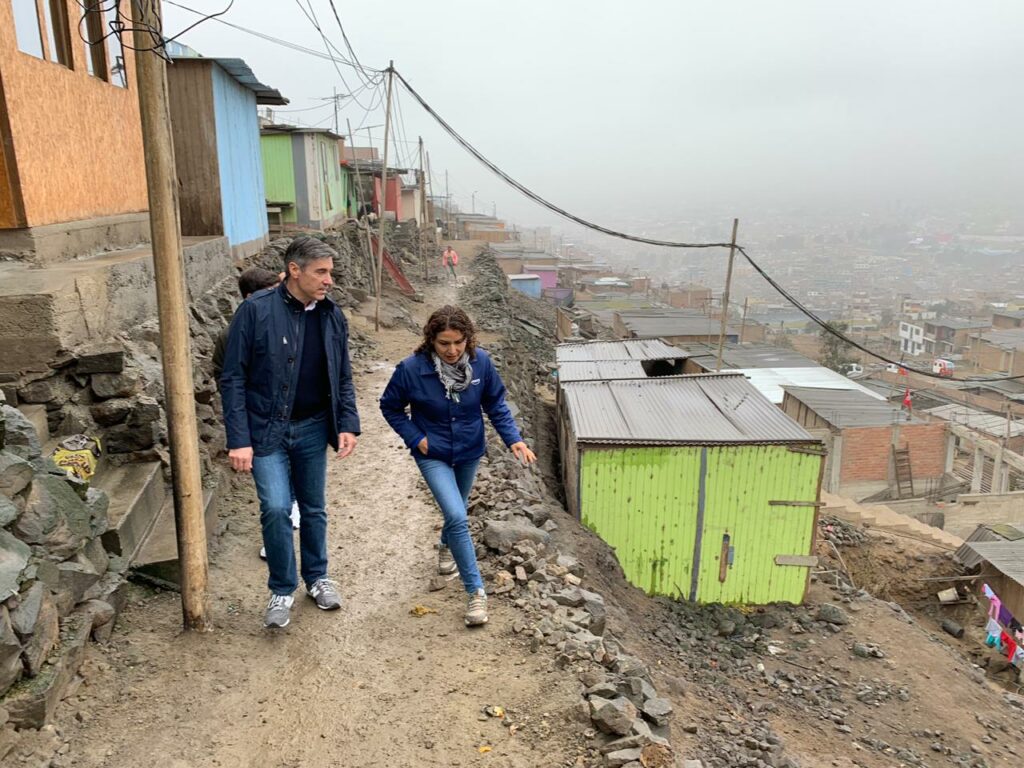
Javier M. Flores, BBVAMF CEO, during a visit to clients served by Financiera Confianza, the Foundation’s institution in Peru
Since its founding, BBVAMF has worked for the sustainable and inclusive development of low-income entrepreneurs who progress thanks to their perseverance, along with the support of productive finance: a methodology applied by the Foundation aimed to create long-term relationships that could help grow businesses, and with it, their well-being, as well as that of their families.
The challenges are great: gender, digital, access to capital and skills gaps…
The BBVAMF is a nonprofit organization created 15 years ago by the BBVA within its Corporate Social Responsibility framework, with a EUR 200 million donation. Through this Foundation, the bank aspires to bring its more than 160 years of experience in the microfinance sector in Latin America, the most unequal region in the planet, according to the UNDP.
To reduce these inequalities, BBVAMF’s strategy focuses on economic and social inclusion, gender barriers and more recently, environmental sustainability harnessing digitization and social impact assessment to achieve this.
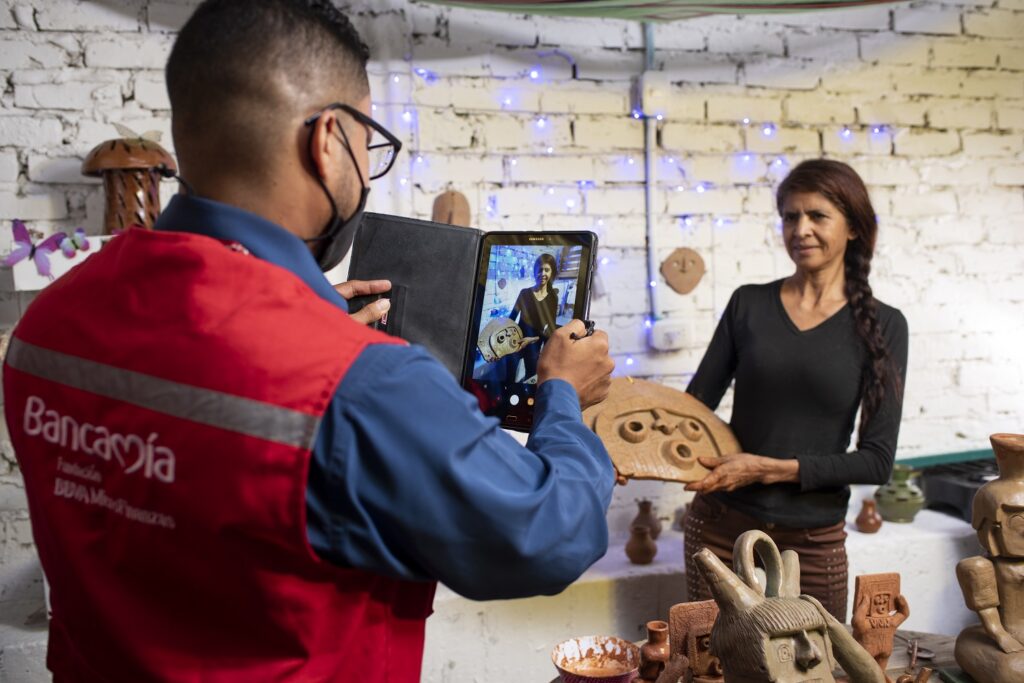
Colombian entrepreneur Fabiola Otero, elaborates handcrafted products from the precolonial malagana culture
The technological challenge
The Foundation’s activity has faced different challenges such as gender, digital, access to capital and skills gaps… The call for action is great and as described by its CEO, “It’s unlikely for one philanthropic actor alone to commit to a challenge of such caliber.”
However, the Foundation has been responding to this call over the years, where it has received acknowledgement for its efforts, at the same time consolidating its leadership as the top global contributor to development in Latin America and the leading gender equality initiatives according to the OECD.
Digitization has revealed itself to be key in achieving financial inclusion and in reaching places where others do not. This is why the Foundation meets the technological challenges of this new era, turning into a sector reference.
Women comprise 57% of the 2.8 million entrepreneurs supported by the BBVAMF
Thanks to this status, in 2020, during the pandemic, the BBVA Microfinance Foundation was able to facilitate access to financial services for almost 300,000 low-income persons through its institutions in Colombia and Peru. Previously financially excluded, owning bank accounts finally allowed these persons to have the means to receive the Government aids during the lockdown.
Thousands of people have benefited from this initiative thanks to the relationship banking model that consists of loan officers from BBVAMF institutions going door to door to offer microfinance products and services. In Colombia, 69%of these low-income people were women, 20% lived in rural areas and 44% possessed very basic education.
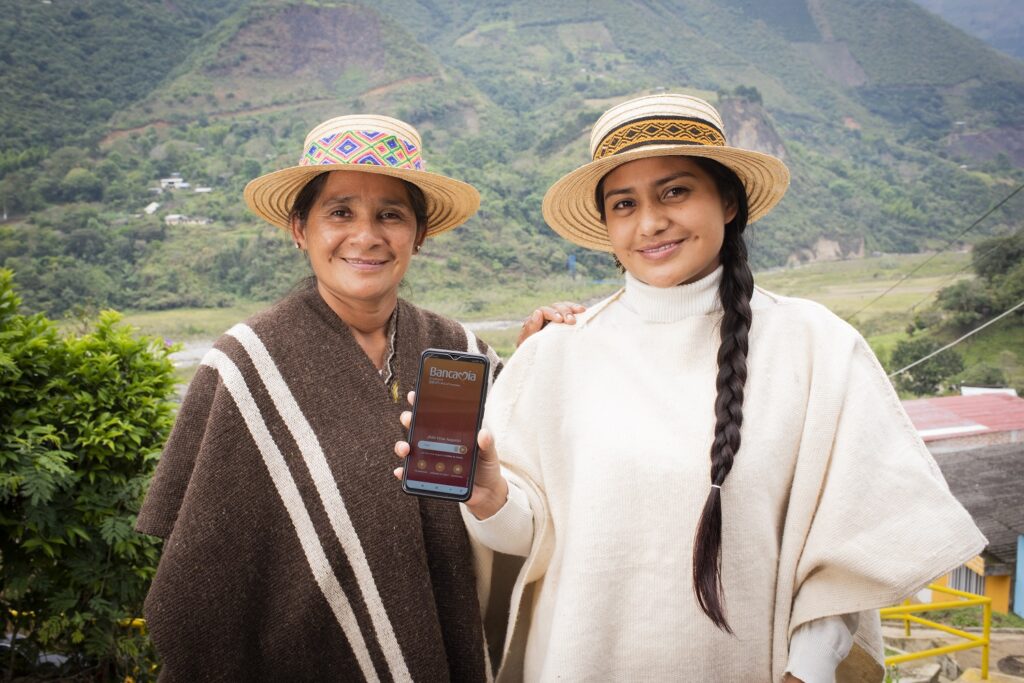
Colombian craftswoman Florinda Chávez makes hats and her daughter manages the business’ finances thanks to mobile banking
The digitization challenge goes beyond creating banking Apps or client service tools. Connectivity is a fundamental resource in remote areas, while training in digital skills has to be facilitated to entrepreneurs so they could access marketing techniques as well as digital platforms so they could optimize their businesses.
According to GSMA’s CEO, Mats Granryd during his panel speech in ‘Conectados por la oportunidad digital’, “Although 94% of the global population live in areas with coverage, 43% still don’t have access to the internet. Today’s challenge consists of closing the digital usage gap, which is seven times wider than the coverage gap.” He also added that “Digital illiteracy, together with costs, continue to be the main barriers to access internet.”
Women’s empowerment
Fighting for gender equality is also one of the main loci of the Foundation’s activity given that women comprise 57% of the 2.8 million entrepreneurs served by the BBVAMF.
They are mostly family breadwinners. Most of them live alone (single, separated/divorced or widowers) and have dependents under their care. Their children are their main drive to reach for a better life.
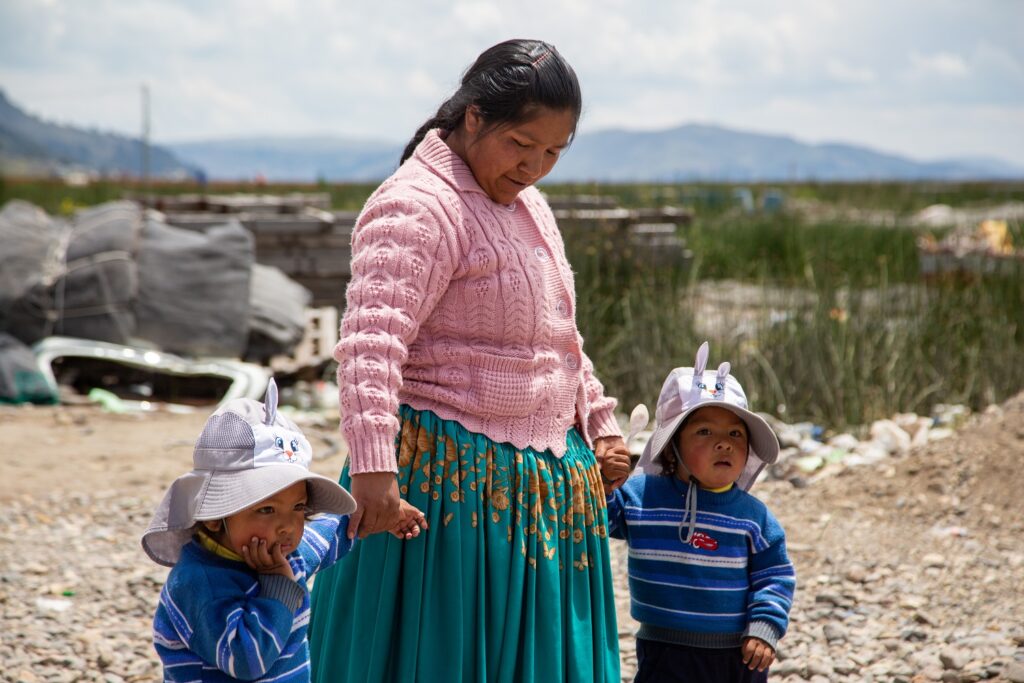
Peruvian entrepreneur Graciela Velázquez with her children. She and her husband Juan Cruz Aruquipa run a small-scale trouch farm
The impact of the digital gap is also greater for women, beyond their lack of access or connectivity. This is why BBVAMF has put into place digital training platforms tailored for women, aside from support to reactivate and transform their businesses.
Environmental sustainability
The impact of natural disasters due to climate change has harsher effects on people living under vulnerable conditions. The BBVAMF also supports entrepreneurs to prepare their businesses and investments in the face of this risk. It is committed to advance efforts that contribute to environmental sustainability which allows entrepreneurs to increase their productivity while caring for their habitat.
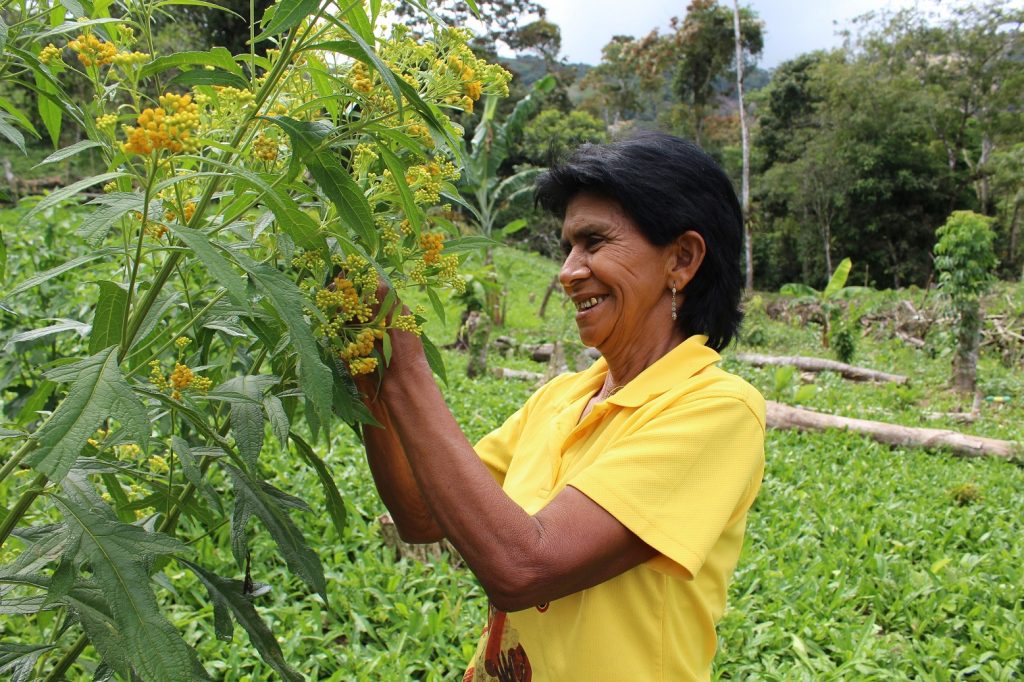
Gabriela Morán, Panamanian farmer and entrepreneur committed to sustsainability
To achieve this, the Foundation has put into place green products and services that allow them to mitigate and adapt to climate change effects and to strengthen their resilience.
Partnerships and acknowledgements
From an institutional standpoint, the BBVAMF has also attained relevant milestones: since 2016 it holds a consultative status in the Economic and Social Council of the United Nations (ECOSOC); in 2018 it has been recognized by the Organization of American States (OAS), through its foundation, The Trust for the Americas, with the Corporate Citizen’s Award for its work towards promoting gender equality. It has also received recognition from the OECD as the second largest international provider of private philanthropy for development; being first in Latin America and also first in the world for its contribution to gender equality.
Support for migrants and refugees
Attending the needs of migrants and refugees has been another priority for the BBVAMF. Mobility between regions has been estimated to affect 40 million people, according to the ECLAC and is characterized by an increase in Venezuelan migration.
Many of them, despite their legal status, live under critical and uncertain labor conditions, with low salaries and without social security. Microfinance play an important role in supporting them, thanks to its capacity to deliver a personalized attention to people in vulnerable situations who, otherwise, don’t have access to traditional banking services.
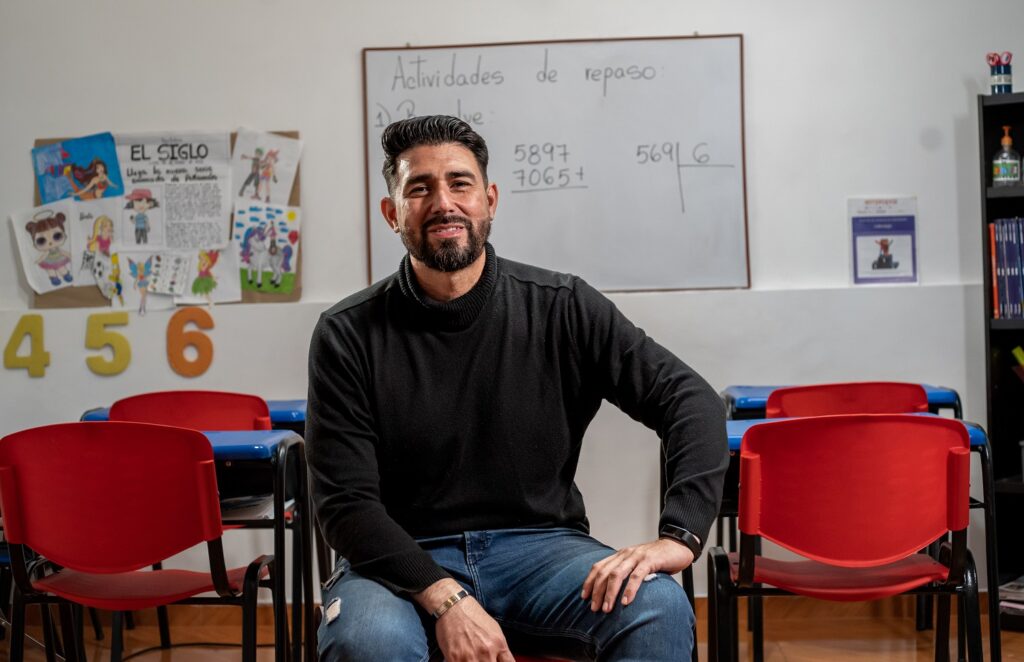
Andrés Hernández, Venezuelan refugee, has received financing and skills training from Bancamía (Colombia) to start a new life in his new country
By the end of 2021, Bancamía (Colombia), Fondo Esperanza (Chile) and Microserfin (Panama), supported 79,500 displaced persons, migrants and refugees through specialized initiatives like Empropaz (Colombia), Banca Comunal Migrante (Chile) or UNHCR (Panama), among others.
Education and skills training
“Education, along with entrepreneurship, is one of the factors that influence the most on the progress and development of people and societies”, assures BBVAMF’s CEO. Contributing to training low income entrepreneurs is also a requisite that was already palpable before the pandemic. It is currently among the Foundation’s priorities, mostly motivated by the need to learn digital skills.
More than half a million entrepreneurs received training in 2021
In 2021, more than half a million entrepreneurs received training through BBVAMF’s institutions, mainly financial education, but also courses on business management, marketing or usage of online platforms. Among them, more than 200,000 participated in online classes.
The education of their children also encourages many of them to work hard, in spite of the difficulties. It’s also the best way to fight inequalities and to help them improve their lives and that of their communities. This is why BBVA and Bancamía awarded scholarships so that entrepreneurs’ children could study for a degree.
Impact assessment
Lastly, all of the challenges met by BBVAMF in these last 15 years, as well as its achievements, have always been backed by its Social Impact Assessment model. Thanks to the data gathered, better knowledge about the entrepreneurs’ conditions could be collected and organized so as to design more adequate products and services for them.
These data confirm that after two years of working with the BBVAMF, one out of three abandon poverty, their sales grow up to 18% and their surplus, upt to 17%.
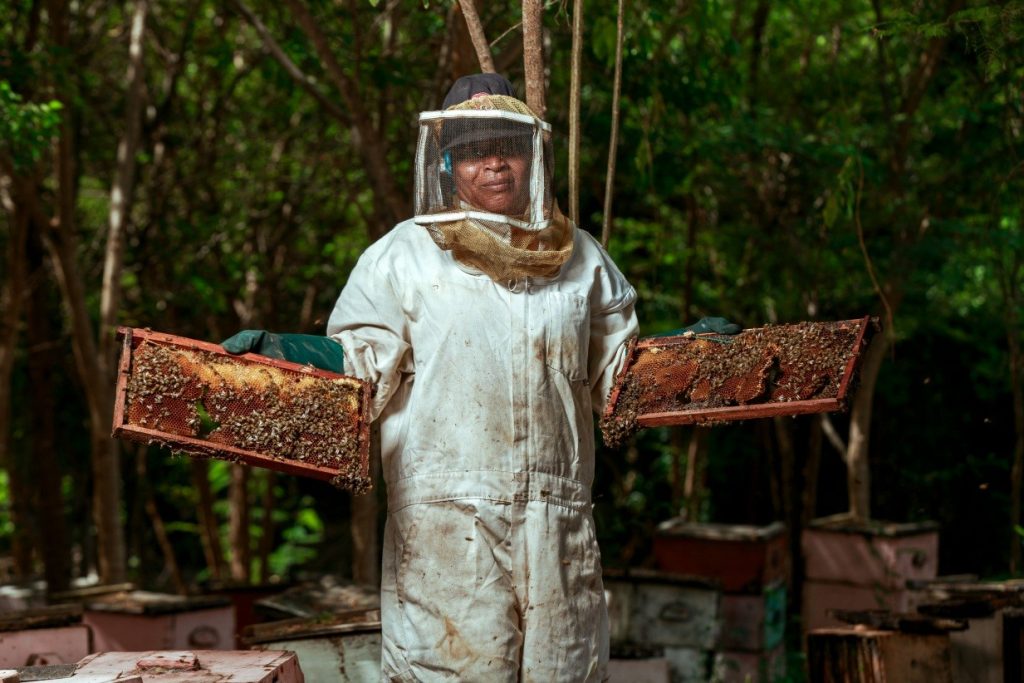
Andrea Persinal, Chilean entrepreneur supported by BBVAMF
These figures are evidence of how important microfinance is as a tool for social change. As Javier M. Flores shares in a recent interview, “the Foundation’s success is having been loyal to its founding principles, not having moved an inch from our institutional purpose, from what is our reason for being: to promote economic and social development among the more vulnerable populations who experience many kinds of scarcity.”
Entrepreneurs are strong, capable and possess the drive to move forward. They only need opportunity and resources. “That is our role”, said Flores, “to help people born in less advantageous situations to advance their businesses and enter the formal economy.” This makes them proud of their achievements and they know that with hard work and determination, they can reach their goals and improve their lives and that of their families.

